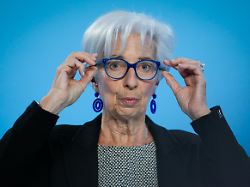ECB does not want interest rate pause
Lagarde sees high wage settlements as a risk
5/4/2023 5:02 p.m
In its seventh interest rate hike in a row, the European Central Bank has increased key interest rates by 0.25 percentage points. ECB boss Lagarde emphasizes that the fight against inflation will not take a break for the time being. Currently high wage agreements are a risk for a wage-price spiral.
According to President Christine Lagarde, the latest interest rate decision by the European Central Bank (ECB) is based on a broad consensus among the monetary authorities. In the end, a “balancing act” based on “almost unanimous approval” was successful, said the Frenchwoman after the interest rate decision. All agreed that an increase was necessary and that a break was out of the question. No one was therefore in favor of unchanged interest rates. However, some would have felt a bigger step of half a percentage point was appropriate, Lagarde acknowledged.
Ultimately, there was very strong agreement at the meeting for a smaller rate hike of a quarter of a percentage point: “We still have more ground to make up,” added Lagarde, with a view to the fight against rampant inflation. After months of falling inflation, inflation in the euro area picked up again slightly in April. Consumer prices increased by 7.0 percent over the year. This means that inflation is still more than three times as high as the target of two percent, which the European Central Bank (ECB) is aiming for as the optimum value. Inflation fell to 6.9 percent in March, after 8.5 percent in February. The core rate, which excludes volatile energy and food prices as well as alcohol and tobacco, fell only slightly in April to 5.6 percent from 5.7 percent in March.
The stubbornly high core rate is driving many currency watchdogs. Because this could signal that the price surge in the euro area is possibly slowing down more slowly than previously thought. The ECB has now signaled that it needs to do more to curb inflation. “The future decisions of the Governing Council will ensure that the key interest rates are brought to a sufficiently restrictive level to achieve a timely return of inflation to the medium-term 2 percent target,” said the ECB statement. This level will be maintained for as long as necessary.
“Wage settlements contribute to inflation”
Lagarde cited the current wage settlements in the euro area as the reason for persistently high inflation. “The most recent wage settlements have increased the risk of inflation,” explained Lagarde in Frankfurt. This is especially true when companies’ profit margins remain high. The stronger wage settlements are likely to contribute more to inflation this year, the currency watchdog added.
In Germany, the largest economy in the euro area, the collective bargaining parties recently agreed on a contract for the approximately 2.5 million employees in the public sector. According to the federal chairman of the civil servants’ association DBB, Ulrich Silberbach, the table increases alone are between eight and 16 percent, depending on the salary groups. From the point of view of some economists, the danger of a wage-price spiral has increased, even if a large part of the contract consists of staggered one-off payments.
If prices and wages continue to drive each other up, it would become even more difficult for the ECB to curb high inflation in the euro area. “Wage pressure has recently increased despite the weaker economy,” said the chief economist at DZ Bank, Michael Holstein. “Collective bargaining parties, companies and consumers must be able to rely on a return to price stability, otherwise further price increases will be cemented and consolidated in the economic plans for the future,” said Michael Heise, chief economist at financial services provider HQ Trust.
